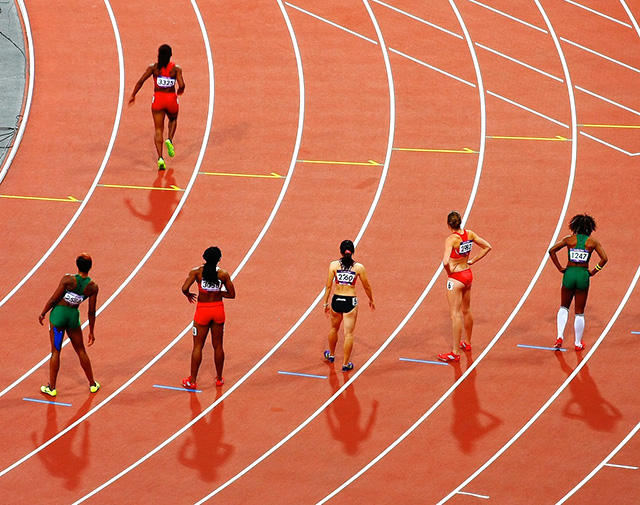The nutrition goals for athletes can vary over the competitive year. What they should be focusing on will vary depending on what training phase they are in. Generally, the season can be divided into an off-season, lead-up or pre-competition phase, and a competition phase. On a smaller scale, to optimise the specific goals trying to be achieved, you should be planning the meals of the week and even planning the food for each day.
 pre-season plans can put you at the head of the pack come competition time
pre-season plans can put you at the head of the pack come competition timeOff-Season
The off-season is when a lot of the nutrition work is done. In terms of fitness the athlete will be aiming to maintain the levels achieved during the season, or to get into better shape for when they return to the club for pre-season training. Even though the off season is a time for relaxation and having a break from sport, athletes will have to be a little more diligent and aware of what they are eating. Nutritional intake may need to be reduced to match the change in activity level.
Ideally, the aim of the off-season is to at least maintain the levels achieved during the season, rather than letting it go and having to put in hard work to get back to where they left off. For motivated athletes, this is the time to get into better shape for when they return to the club for pre-season training.
As during the off season training is reduced, there is a risk of gaining too much unwanted mass. Not only do you have to reduce your intake due to the reduction in energy expenditure, but to lose some weight, you will need to reduce your intake even more to allow for weight loss. See our article on weight loss during the off season.
Muscle mass should be maintained, or increased for the younger guys who are aiming to gain weight for the next season. The off-season is a good time to effectively increase lean body mass, while training and games are not taxing the energy intake. See our article on weight gain during the off season.
Pre-Season
The pre-season for the athlete is a very important time. Training will become more high intensity and the food intake should also match this. Nutritional recovery from the sessions is also important to consolidate these gains. The pre-season is the time to test out the nutrition plans during the high-intensity training sessions and trial games.
Competition
During the competition phase the role of the dietitian is reduced. All plans should have been trialled and tested, and protocols put in place. It is not a time where you should be making too many changes. Pre-game meals should be sorted, as well as recovery foods.
Short Term Plans
While there should be long term plans to map out the goals and nutrition methods for the season, there should be some planning of the meals for each week and each day to optimise the specific goals trying to be achieved. See our exampkle of a Daily Food Plan plus suggestions to keep hunger and fatigue away by eating specific macfro-nutritients.
Related Pages
- An Athlete's Daily Food Plan — eating well takes planning along with some self-discipline.
- Fitness-Focused Meal Plans to Boost Athletic Performance
- Athletes Shouldn't Go Hungry — the types of foods consumed can have an impact on energy levels.
- Nutrition for the Off Season
- Nutrition for Traveling
- Meal plans: Eat to Get Big — A simple program to gain mass


 Current Events
Current Events